

From social pressures to pushing behavioural boundaries to experimentation with drugs and alcohol to boy-girl issues, to acne – a pimple in the wrong place on a wrong day can turn into the most dramatic event of an adolescent’s entire life. Have you wondered why it is such?
These formative years – ages 12 to 18 – provide a transition between childhood and adulthood through an in-depth exploration of beliefs, goals, and values while searching for personal identity and a sense of self. Teenagers often become increasingly independent and begin to consider careers, family, friends, and their place in society. Therefore, the process of self-discovery taking place in adolescence can either be profound and exciting or an utter nightmare, making an adolescent identity development the central feature of teen life.
This resource centre aims to equip parents with teenagers with the necessary resources to help them understand their teen better through taking a closer look at Stage 5 of Erik Erikson's theory of psychosocial development (Identity vs Role confusion) to better understand their teenager's behaviour. In particular, to explain why and how teenagers strive to forge a sense of identity during adolescence and what parents can do to support their teens during this phase.
(Video) 8 Stages of Development by Erik Erikson. Stages of Human Development: What It Is & Why It’s Important. Tables of Contents Imagine two children born in the same town and the same year to families with similar socioeconomic statuses.

One child grows up to be assertive and confident, while the other grows up to be timid and shy. The study of the stages of human development can help explain the reasons for these differences and much more. What is human development, exactly? Erikson Stages of Psychosocial Development in Plain Language. Erik Erikson is one name you might notice come up again and again in the parenting magazines you leaf through. Erikson was a developmental psychologist who specialized in child psychoanalysis and was best known for his theory of psychosocial development. Psychosocial development is just a fancy phrase that refers to how a person’s individual needs (psycho) mesh with the needs or demands of society (social). According to Erikson, a person passes through eight developmental stages that build on each other. Erik Erikson's Stages of Psychosocial Development.
Erik Erikson was an ego psychologist who developed one of the most popular and influential theories of development. While his theory was impacted by psychoanalyst Sigmund Freud's work, Erikson's theory centered on psychosocial development rather than psychosexual development. The stages that make up his theory are as follows:1. (Research paper) Erik Erikson and psychosocial development. Comments. (Video) A crash course on teenage psychology. (Video) identity vs role confusion and its implications on parenthood. (Video) Identity vs. Role Confusion. Identity vs. Role Confusion in Erikson's Theory. Identity versus confusion is the fifth stage of ego according to psychologist Erik Erikson's theory of psychosocial development.
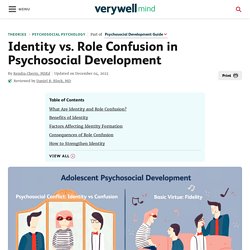
This stage occurs during adolescence between the ages of approximately 12 and 18. During this stage, adolescents explore their independence and develop a sense of self. According to Erikson, people progress through a series of stages as they grow and change throughout life. During each stage, people face a developmental conflict that must be resolved to successfully develop the primary virtue of that stage. Identity Crisis: Definition, Symptoms, Causes, and Treatment. Are you questioning who you are?

Maybe what your purpose is, or what your values are? If so, you may be going through what some call an identity crisis. The term “identity crisis” first came from developmental psychologist and psychoanalyst Erik Erikson. Comments. Adolescent Identity Development: What to Expect in Teens.
Adolescent Identity Development: The Factors of Change Among the profound and exciting changes taking place in adolescence is the process of self-discovery. Our teens are working to figure out who they are, making adolescent identity development a central feature of teen life. Young people’s identities are shaped by lots of factors — family, cultural and societal expectations, experiences with institutions like school and the media, and friends. Young people also take active steps and make choices that shape their identity. Lifespan Development. Learning Outcomes Describe changes in self-concept and identity development during adolescenceExplain Marcia’s four identity statuses Psychosocial Development.
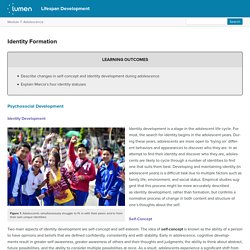
Chapter 21: Psychosocial Development in Adolescence – Human Behavior and the Social Environment I. Describe the changes in self-concept and self-esteem in adolescenceSummarize Erikson’s fifth psychosocial task of identity versus role confusionDescribe Marcia’s four identity statusesSummarize the three stages of ethnic identity developmentDescribe the parent-teen relationshipDescribe the role of peersDescribe dating relationships Self-concept and Self-esteem in Adolescence In adolescence, teens continue to develop their self-concept.
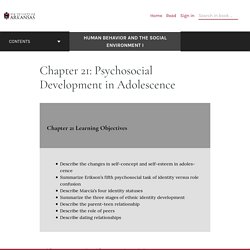
Their ability to think of the possibilities and to reason more abstractly may explain the further differentiation of the self during adolescence. However, the teen’s understanding of self is often full of contradictions. Young teens may see themselves as outgoing but also withdrawn, happy yet often moody, and both smart and completely clueless (Harter, 2012). (Research paper) Identity development during adolescence. (Video) Self concept, self identity, and social identity. Comments. How Adolescents Search for Identity. Menu Search Close.
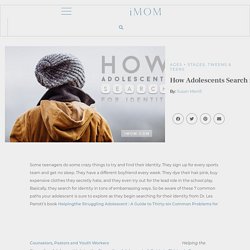
ADOLESCENCE AND IDENTITY DEVELOPMENT - SoCal Adolescent Wellness. The World Health Organization (WHO) defines an adolescent as any person between the ages 10 and 19, while American psychologists typically narrow it to 12 to 18 years of age.

But under either classification, it is clearly a difficult and challenging time of life, for the adolescent and their parents, relatives and adults around them. According to Amy Bellows, Ph.D., it is a time when teens bodies kick into overdrive. Your Teen's Search for Identity. Their bodies kick into overdrive.

They find themselves disoriented, scared and alone. They become moody, secretive and sarcastic. You don’t recognize your own child. What happened to the child you used to know? The answer: adolescence. (Video) Developing a sense of self through socialization. (Research paper) Developing a sense of self from the influence of media. (Research paper) Developing a sense of self through the influence of communication technology in adolescent. (Research paper) Developing a sense of self through the effects of parental involvement. (Research paper) Ethnic Identity in Everyday Life: The Influence of Identity Development Status. Comments. Identity SHORT FILM 2012 (Award Winning Inspirational Short) Comments about the video.
Identity and Adolescents: How Adults Can Help - NCYI - National Center for Youth Issues. By Cheryl Jones, ACSW, Adolescent and Family Counselor This is an article that was printed in The Fourth and Fifth Rs: Respect and Responsibility, Volume 10, Issue 2, Winter 2004.
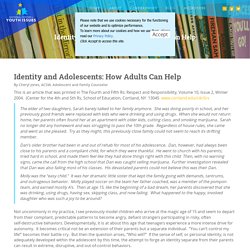
(Center for the 4th and 5th Rs, School of Education, Cortland, NY 13045 www.cortland.edu/c4n5rs The elder of two daughters, Sarah barely talked to her family anymore. She was doing poorly in school, and her previously good friends were replaced with kids who were drinking and using drugs. When she would not return home, her parents often found her at an apartment with older kids, cutting class, and smoking marijuana.
Six Ways to Build Your Teen's Identity - Focus on the Family. Marriages and families are in trouble after the challenges of last year.

If it's not too much to ask, would you help equip these families with the resources they need to put Jesus at the center of their home? Yes, I will help struggling families! Español. (Infographics) Improving Communication With Your Teen.